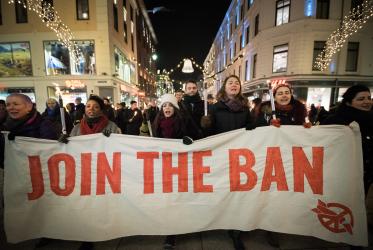On first anniversary of treaty adoption, WCC urges Marshall Islands to ratify nuclear ban treaty
In a letter to Sen. Maynard Alfred, chairperson of the Parliamentary Standing Committee on Foreign Affairs & Trade of the Republic of the Marshall Islands, the World Council of Churches (WCC) urged the nation to sign and ratify the Treaty on the Prohibition of Nuclear Weapons (TPNW).
The letter, signed by Peter Prove, director of the WCC Commission of the Churches on International Affairs, notes that “WCC’s worldwide membership includes churches in the Marshall Islands and other places affected by nuclear weapons tests.”
WCC and its member churches advocated for the new treaty to address the impact of these weapons on human beings and the environment.
“We thank God that these concerns are reflected in the TPNW,” the letter continues. “It has provisions on victim assistance, radiation exposure and environmental remediation. It calls attention to the particular effect on women and girls, and on indigenous peoples.”
It was one year ago, on 7 July 2017, that the text of the Treaty on the Prohibition of Nuclear Weapons was adopted by 122 UN Member States. This represented the realization of a long-held ecumenical ambition, and a major step on the path to global de-nuclearization. The WCC has a long history of advocating against the possession, use and threat of use of nuclear weapons, going back to 1948 when the WCC’s founding Assembly referred to warfare with nuclear weapons as a “sin against God and a degradation of humankind.” WCC participated actively in the International Campaign to Abolish Nuclear Weapons (ICAN) in lobbying for the new treaty.
In the year since the TPNW was adopted, 59 States have signed the Treaty, and 10 have ratified it. 50 ratifications are required to bring it into effect, and to contribute to the delegitimization of the continued development, possession and reliance on nuclear weapons.
In calling for the Marshall Islands to ratify the TPNW, the WCC letter noted that it was a young indigenous woman from the Marshall Islands, Darlene Keju, a victim of the health impacts of nuclear testing in her region, who raised the consciousness of churches around the world with her personal testimony at the 1984 WCC Assembly in Vancouver, Canada.
According to Director Prove, the catastrophic consequences of the detonations over Hiroshima and Nagasaki in 1945 as well as the consequences of nuclear testing programmes in the Pacific and elsewhere illustrate with tragic effect all the reasons why nuclear weapons must never be used again, anywhere, for any reason. “Arguments of military deterrence or national security cannot provide adequate moral justification for the threat of the mass murder of civilians, annihilation of entire cities, and long lasting impacts on health, the environment, the economy and on global peace posed by such indiscriminately and inter-generationally destructive weapons”, Prove said.
In a statement adopted in November 2017, the Executive Committee on the WCC urged all states to sign, ratify and implement the TPNW, and invited churches to engage in biblical, theological and ethical reflection on the possession, use and impact of nuclear weapons, and on the doctrine of ‘nuclear deterrence’, in the current global context.
Treaty prohibiting nuclear weapons represents “long-held dream” for WCC (WCC press release 13 December 2017)








